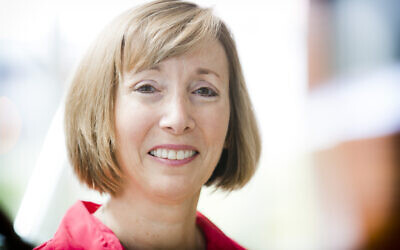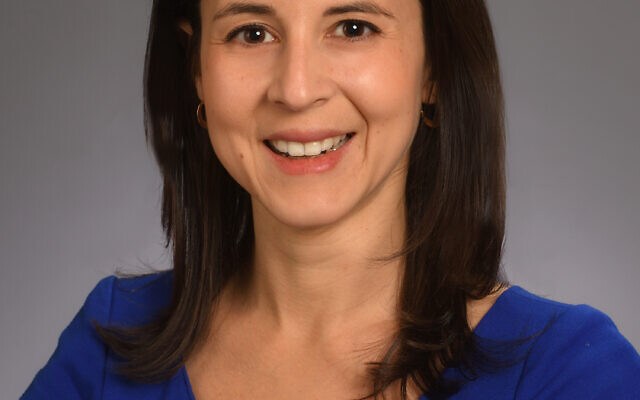JScreen’s Genetic Cancer Test Goes National
The tests are available to anyone over 21 years old.
It’s been less than a decade since JScreen was launched in Atlanta to test the Jewish population for the risk of having a child with a genetic disease such as Tay-Sachs or Gaucher disease. Now headquartered at Emory University’s Department of Human Genetics, the nonprofit genetic education and screening program is reaching across the country to the general public to offer a simple at-home test for 63 genetic defects that increase the chances of a full range of cancers.
“Knowledge is power. With an understanding and awareness of their cancer risks and available options, individuals can work with their health-care providers on next steps,” said Karen Arnovitz Grinzaid, assistant professor of human genetics at Emory University School of Medicine, and JScreen’s executive director.
“Launching our new cancer program and providing convenient and affordable access to cancer genetic testing will help save lives.”
The cancer testing program will be marketed to anyone. A person doesn’t need a family history of cancer nor be Jewish, although the most well-known of the genetic defects – BRCA 1 and BRCA 2 – are more common in Jews with Ashkenazi backgrounds. Those genetic defects increase the risk of ovarian, breast, pancreatic, colorectal and other cancers.
“We are testing for more than 40 types of cancers,” said Grinzaid, clarifying that the test checks for susceptibility of cancer, not actual cancers.
The test is a simple, at home, saliva-collection process. The heavily subsidized test will cost someone using insurance $199 and it includes genetic counseling. If someone doesn’t have insurance, or doesn’t want to use it, the cost is $349.
“The knowledge of these susceptible genes has blossomed in the last few years,” noted Dr. Jane Lowe Meisel, associate professor of hematology and medical oncology at Emory, and medical director for JScreen’s cancer program.
Indeed, the BRCA 1 genetic defect was only discovered in 1994, the BRCA 2 genetic defect, a year later. While the general population has a 1 in 500 chance of carrying the BRCA genetic defect, Ashkenazi Jews have a 1 in 40 chance. Someone testing positive for the BRCA 1 genetic defect has an 87 percent lifetime chance of being diagnosed with breast cancer, according to JScreen. Someone testing positive for the BRCA-2 genetic defect has an 84 percent chance of being diagnosed with breast cancer.

Grinzaid said JScreen’s goal is to test 1,000 individuals in the first year, and another 2,000 in 2022. The cancer genetic screening program will be marketed digitally and through traditional media to medical organizations, synagogues, interfaith and non-Jewish communities, she said.
“We’re starting to push out marketing now,” she added.
The difference between this genetic cancer screening and JScreen’s original reproductive testing is that the latter helps future parents. “But with the cancer screening, if we find a mutation, it affects family members. And once you have the mutation, the risk is already there. There are all these people whose lives you can potentially save,” Grinzaid said.
“Prevention and early diagnosis is so important,” emphasized Dr. Meisel. “You get information that is actionable and preventative.”
Melanie Zucker understood the power of knowledge. Her mother died of breast cancer in 1989, long before the BRCA genetic defects were discovered. Her younger sister, at age 32, discovered breast cancer and learned she was BRCA 1 positive. Although she’s had chemotherapy and several surgeries, she’s been cancer free for 20 years, Zucker said.
Based on her family history, Zucker – a member of Temple Sinai – had genetic testing and learned she, too, was positive for the BRCA 1 genetic defect. With that knowledge, she chose to have a prophylactic double mastectomy and her ovaries removed. “I’ve never looked back,” she said.
Zucker said she is “thrilled” with the new national genetic cancer testing program. “If we have knowledge of a predisposition for something, we can be on the lookout” for it. Surgeries are not the only option genetic counselors would provide. Extra screening for the various cancers is also possible.
JScreen has asked Zucker to be an advocate for its new national testing program. As part of the campaign to make people aware of the test, Zucker hopes to “tell my story and talk about how having the knowledge” is so important. “This will be life-changing for so many people nationally,” she said.

Another Atlantan who will help spread the word about the new genetic cancer test is Gene Rubel. He said he’s “been on a crusade for this issue for years. Men need to be tested just like women. It’s not a women’s issue.”
Rubel would know since he has tested positive for the BRCA 1 genetic defect. His mother, two aunts, an uncle and a sister all were diagnosed with cancer. His sister had “multiple breast cancer diagnoses but died of ovarian cancer,” he said.
After he tested positive for the gene defect, Rubel said he was “devastated.”Anyone with a mutation has a 50 percent chance of passing it down to each of his or her male and female children. Father of four children, Rubel wondered, “what did I give them and how do I tell them? This is a generational issue.”
Grinzaid noted that it is costing JScreen about $500,000 to launch the nationwide testing program. The Marcus Foundation has provided some funding but JScreen is looking for additional funding to “extend its reach and maximize its impact.”
For more information about the testing, visit JScreen.org




comments